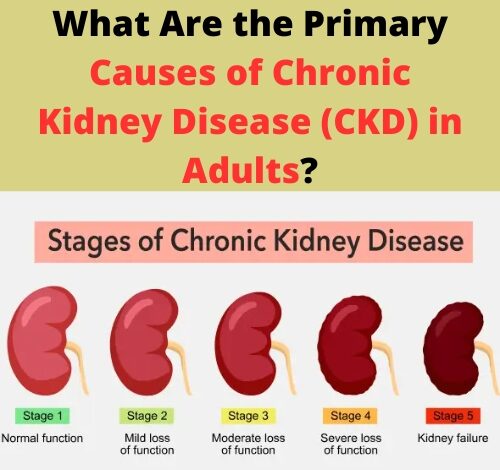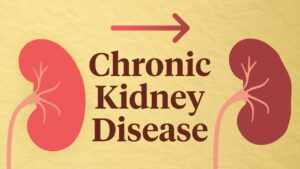What Are the Primary Causes of Chronic Kidney Disease (CKD) in Adults?

Chronic kidney disease (CKD) is a progressive condition that affects millions of adults worldwide. It is characterized by the gradual loss of kidney function over time, often leading to serious health complications. Understanding the causes of chronic kidney disease in adults is crucial for early intervention, prevention, and management of this condition. The primary causes of CKD, their impact on kidney health, and potential strategies to mitigate risks.
Understanding Chronic Kidney Disease
Chronic kidney disease is defined as the persistent damage or reduced function of the kidneys for three months or longer. The kidneys play a vital role in filtering waste, excess fluids, and toxins from the blood, maintaining electrolyte balance, and producing essential hormones such as erythropoietin, which stimulates red blood cell production.
CKD is often referred to as a “silent disease” because it progresses slowly and may not show noticeable symptoms in its early stages. By the time symptoms appear, significant kidney damage has often already occurred. The disease is classified into five stages based on the estimated glomerular filtration rate (eGFR), which measures how well the kidneys filter blood.

The Primary Causes of Chronic Kidney Disease in Adults
Several factors contribute to the development of chronic kidney disease in adults. These causes are often interconnected, and addressing them requires a holistic approach to healthcare.
1. Diabetes Mellitus
Diabetes mellitus, particularly type 2 diabetes, is the leading cause of chronic kidney disease in adults. High blood sugar levels damage the tiny blood vessels (glomeruli) in the kidneys, impairing their ability to filter waste effectively. This condition, known as diabetic nephropathy, accounts for approximately 40% of CKD cases globally.
- Mechanism: Prolonged hyperglycemia leads to thickening of the glomerular basement membrane and scarring (glomerulosclerosis), reducing kidney function.
- Prevention: Effective blood sugar control through medication, diet, and regular monitoring can significantly reduce the risk of diabetic nephropathy.
2. Hypertension (High Blood Pressure)
Hypertension is another major cause of chronic kidney disease. The kidneys rely on a consistent blood flow to filter waste. When blood pressure is consistently high, it places excessive strain on the blood vessels in the kidneys, causing damage over time.
- Mechanism: High pressure damages renal arteries, leading to reduced kidney perfusion and chronic injury.
- Prevention: Managing blood pressure through lifestyle changes, medications, and regular check-ups can prevent kidney damage.
3. Glomerulonephritis
Glomerulonephritis refers to inflammation of the glomeruli, the kidney’s filtering units. This condition can be acute or chronic and is often caused by infections, autoimmune diseases, or certain genetic disorders.
- Mechanism: Inflammation disrupts the filtering process, leading to protein and blood leakage into the urine.
- Prevention: Prompt treatment of infections and management of autoimmune conditions can help minimize the risk of chronic damage.
4. Polycystic Kidney Disease (PKD)
Polycystic kidney disease is a genetic disorder that causes the formation of fluid-filled cysts in the kidneys. Over time, these cysts enlarge and impair kidney function.
- Mechanism: The cysts replace normal kidney tissue, reducing the organ’s ability to filter waste.
- Prevention: While PKD is hereditary and cannot be prevented, early diagnosis and lifestyle adjustments can slow its progression.
5. Chronic Use of Medications
The prolonged use of certain medications, such as nonsteroidal anti-inflammatory drugs (NSAIDs), can contribute to chronic kidney damage. These drugs reduce blood flow to the kidneys, especially when taken in large doses or over extended periods.
- Mechanism: NSAIDs block the production of prostaglandins, which are essential for maintaining kidney blood flow.
- Prevention: Limiting the use of nephrotoxic medications and consulting healthcare providers for safer alternatives can protect kidney health.
6. Infections
Chronic or recurrent kidney infections, such as pyelonephritis, can lead to scarring and permanent kidney damage. Infections are often caused by untreated urinary tract infections (UTIs) that spread to the kidneys.
- Mechanism: Repeated infections cause inflammation and scarring, reducing kidney function over time.
- Prevention: Prompt treatment of UTIs and maintaining good hygiene can prevent infections from progressing to the kidneys.
7. Obstructive Uropathy
Obstructive uropathy occurs when there is a blockage in the urinary tract, leading to the backup of urine into the kidneys. This condition can result from kidney stones, tumors, or an enlarged prostate in men.
- Mechanism: The pressure from urine buildup damages kidney tissues and reduces function.
- Prevention: Regular screening and treatment of urinary tract blockages can help avoid kidney damage.
8. Autoimmune Diseases
Autoimmune diseases such as lupus and vasculitis can cause inflammation of the kidneys, leading to a condition known as lupus nephritis or vasculitis-associated nephritis.
- Mechanism: The immune system mistakenly attacks kidney tissues, causing chronic inflammation and scarring.
- Prevention: Early diagnosis and treatment of autoimmune diseases can prevent or minimize kidney involvement.
9. Cardiovascular Disease
There is a strong link between cardiovascular disease and chronic kidney disease. Conditions like heart failure and atherosclerosis can reduce blood flow to the kidneys, leading to chronic damage.
- Mechanism: Reduced cardiac output or narrowed arteries limit kidney perfusion, impairing function.
- Prevention: Managing cardiovascular risk factors such as high cholesterol and obesity can protect kidney health.
10. Obesity
Obesity is an independent risk factor for chronic kidney disease. Excess body weight increases the workload on the kidneys, leading to hyperfiltration and long-term damage.
- Mechanism: Increased metabolic demands and fat accumulation in the kidneys contribute to structural changes and reduced function.
- Prevention: Maintaining a healthy weight through diet and exercise can reduce the risk of CKD.
11. Smoking
Smoking has been linked to chronic kidney disease due to its adverse effects on blood vessels and kidney tissues.
- Mechanism: Smoking promotes atherosclerosis, reduces blood flow to the kidneys, and increases the risk of proteinuria.
- Prevention: Quitting smoking is one of the most effective ways to protect kidney health and overall well-being.
12. Age and Genetic Predisposition
The risk of chronic kidney disease increases with age, as kidney function naturally declines over time. Additionally, a family history of CKD or related conditions can increase susceptibility.
- Mechanism: Aging kidneys lose nephrons, while genetic mutations or inherited conditions predispose individuals to CKD.
- Prevention: Regular check-ups and early screening for high-risk individuals can aid in early detection and management.
The Impact of Chronic Kidney Disease
CKD has far-reaching consequences for an individual’s health and quality of life. It increases the risk of cardiovascular diseases, anemia, bone disorders, and electrolyte imbalances. In advanced stages, CKD can lead to end-stage renal disease (ESRD), requiring dialysis or kidney transplantation.
Preventing Chronic Kidney Disease: Key Strategies
While some causes of chronic kidney disease in adults, such as genetic factors, cannot be prevented, there are several lifestyle and medical interventions that can significantly reduce the risk:
- Control Blood Sugar Levels: For individuals with diabetes, maintaining optimal blood glucose levels is crucial for preventing kidney damage.
- Monitor Blood Pressure: Aim to keep blood pressure below 130/80 mmHg through medication, diet, and exercise.
- Adopt a Kidney-Friendly Diet: Limit sodium, processed foods, and protein intake while incorporating fresh fruits, vegetables, and whole grains.
- Stay Hydrated: Drinking adequate water helps maintain kidney function and prevents urinary tract infections.
- Avoid Nephrotoxic Substances: Minimize the use of NSAIDs and other kidney-damaging drugs.
- Quit Smoking: Smoking cessation improves kidney health and reduces cardiovascular risks.
- Exercise Regularly: Physical activity helps manage weight, blood pressure, and blood sugar levels.
- Regular Check-Ups: Annual health screenings can help detect early signs of CKD and its risk factors.
Conclusion
Chronic kidney disease is a complex condition with multiple causes, ranging from diabetes and hypertension to genetic factors and lifestyle choices. By understanding the causes of chronic kidney disease in adults and taking proactive steps to address them, individuals can reduce their risk of developing this debilitating condition. Early detection, regular monitoring, and lifestyle modifications are key to preserving kidney function and improving overall health.





